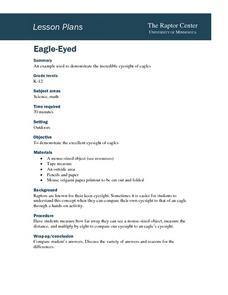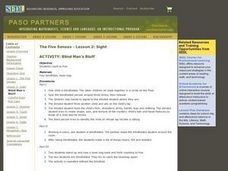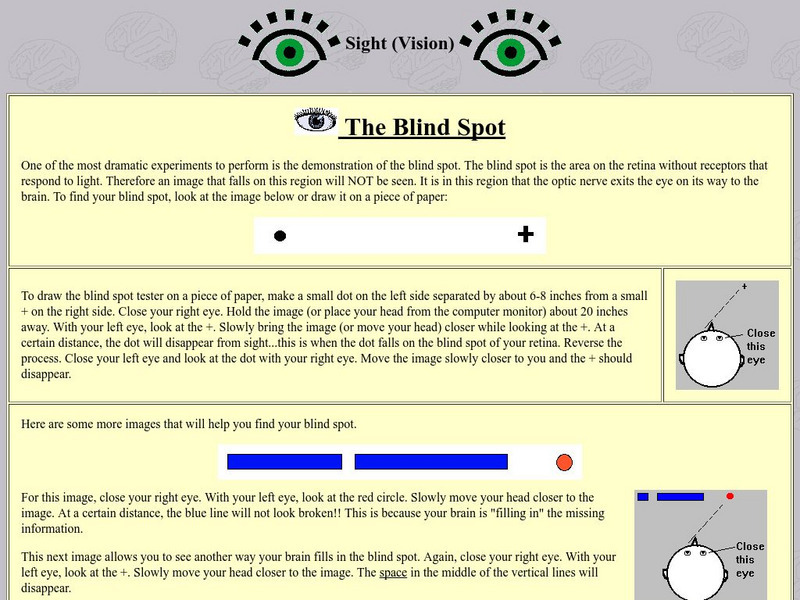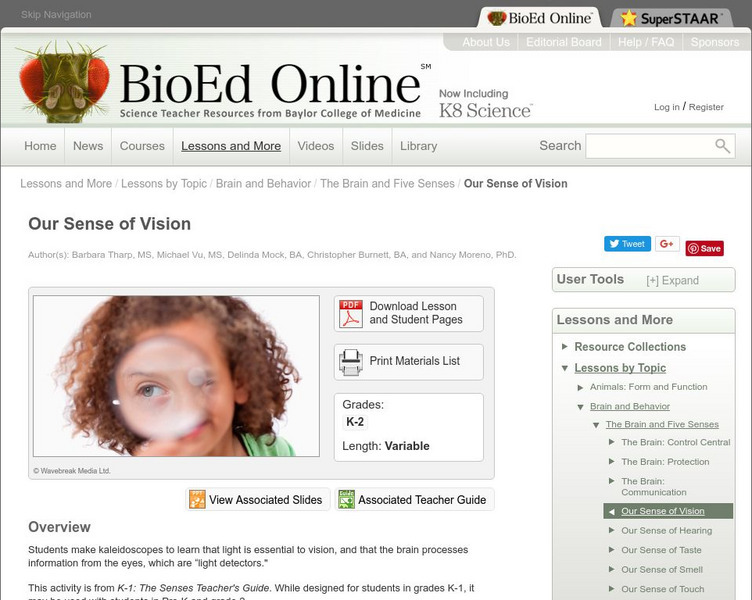Curated OER
Glaucoma Word Search
In this health worksheet, students find the words that are related to glaucoma and the answers are found by clicking the link at the bottom of the page.
Curated OER
Five Fat Turkeys
Students make a tree trunk and branches using brown construction paper. They make thumbprint turkeys using a choice of ink color. Students make the eyes from wiggle eyes and of black ink. They make the beak out of any color foamie triangle.
Curated OER
Mechanism of Our Eyes
Students study the eye as the organ of vision, They look at a drawing of the eyes and study the names of the parts. While working with a partner, they observe what happens when the lights are turned lower and lower. Finally, they look at...
Curated OER
Observing and Discovering Using Our Senses
Third graders decide if it is possible to identify something using only the senses of taste, smell and hearing. They listen to a CD of animal sounds with their eyes closed and attempt to identify the animal. Next, they smell an air...
Curated OER
Five Senses
Students listen to the book "My Five Senses." They work together to classify fifteen objects by the sense that they affect. They discuss the sense organs and complete a chart. Finally, they sort mystery items from a bag which the teacher...
Curated OER
Eagle-Eyed
Students study the eyesight of eagles. They discuss raptors and their eyesight and compare it to their own. They measure how far away they can see a small object and its distance. They calculate the eyesight to measure an eagle's...
Curated OER
The Senses
Students explore activities involving the five senses. They describe objects by touch and participate in craft corners using sand, rice, and blocks. They taste various foods and use their sight to find missing objects. They practice...
Curated OER
Blind Man's Bluff
Students count to five. They use two blindfolds and a bean bag. One child is blindfolded. The other children sit close together in a circle on the floor.
Spin the blindfolded person around three times, then release. The children clap...
Curated OER
Colorful Eyes
Students investigate eye color found most frequently among the boys and girls in the classroom. Creation of a prediction graph is formulated. The survey begins within the classroom
Curated OER
You Won't Believe Your Eyes!
Students gain a basic understanding of the sense of sight. They watch a video on sight, then engage in some vocabulary games, and perform some simple experiments which focus on the basics of sight.
Curated OER
Growing Eyeballs
Young scholars investigate vision and the anatomy of the human eye. They complete a Webquest, watch a video about the structure of the eye, take an online quiz, answer discussion questions, and read newspaper articles about activities...
Curated OER
How We See: The First Steps of Human Vision
Students notice how various images and colors update constantly as they are affected by factors such as distance, background and lighting. They also examine how optometrists developed a standard to evaluate eyesight.
Harvard University
Micro Observatory Robotic Telescope: How Does My Eye Compare to the Telescope?
Your eye is an amazing instrument--and so is the telescope! In this activity you will compare your eye's performance with that of a MicroObservatory online telescope. By the end of this lesson you will know exactly what your telescope is...
Florida State University
Florida State University: Vision and Color Perception
A high-level scientific explanation of the way the eye senses light and sees images and color. Excellent graphics help you visualize complex workings of the human eye.
Georgia State University
Georgia State University: Hyper Physics: Common Eye Defects
The eye and its common defects are discussed along with corrective measures.
University of Washington
Neuroscience for Kids: Vision and Optical Illusions
Wow! A great page full of different experiments to illustrate the phenomena of optical illusions, and then it explains what is happening!
TED Talks
Ted: Ted Ed: The Evolution of the Human Eye
The human eye is an amazing mechanism, able to detect anywhere from a few photons to a few quadrillion, or switch focus from the screen in front of you to the distant horizon in a third of a second. How did these complex structures...
Science Buddies
Science Buddies: Now You See It, Now You Don't: A Chromatic Adaptation Project
This project shows that our perceptions can change, even with the stimulus remains the same. A clear color difference in an image disappears after just 20 seconds of looking at another (special) image.
San Diego Natural History Museum
San Diego Natural History: Kids' Habitat: The Eyes Have It Single Lens Eye
The single-lens eye is found on all vertebrate animals. Learn about the main parts of this eye and the purpose each serves.
San Diego Natural History Museum
San Diego Natural History: Kids' Habitat :The Eyes Have It Compound Eye
Invertebrates are known to have compound eyes. Learn the anatomy and function of this kind of eye.
BioEd Online
Bio Ed Online: Our Sense of Vision
Which parts of the body are involved in vision (seeing)? Is light important for vision? In this lesson students make kaleidoscopes to learn that light is essential to vision, and that the brain processes information from the eyes, which...
Exploratorium
Exploratorium: Optical Illusions
Try these great optical illusions yourself, and read the explanation of how your brain fools your eyes. You will need Shockwave to run these properly.
Other
Lens Shopper: Anatomy of the Eye
Learn about the human body's own "camera" as you explore the inner workings of the human eye. This resource is displayed as a three-dimensional, interactive animation.























